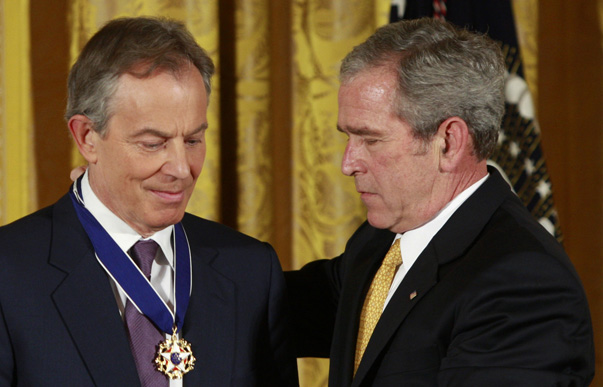Sir John Chilcot has confirmed there is “no realistic prospect” of the Iraq Inquiry delivering its findings before the general election.
The Chilcot inquiry began more than five years ago and was initially expected to publish its final report by the end of 2010, only to get bogged down in years of delays.
Negotiations over the release of conversations between former prime minister Tony Blair and ex-US president George W Bush appear to have been one of the main sticking points.
Mr Blair has appeared in front of the panel twice but has failed to satisfy some critics, who say the man who took Britain to war in 2003 still has questions to answer.
And there are still some key points where Mr Blair’s evidence is contradicted by other witnesses. Whose story will the Chilcot Inquiry believe?
Did he mislead parliament?
On 15 January 2003 Mr Blair told the Commons there were circumstances in which it would be legal to launch an attack on Saddam Hussein without a second United Nations resolution.
But his attorney general Lord Goldsmith, has said he was “uncomfortable” with such statements.
In a written question from the inquiry, Lord Goldsmith was asked if he felt Mr Blair’s words “were compatible with the advice you had given him”. He answered: “No.”
At the time of Mr Blair’s statement to parliament, Lord Goldsmith’s advice was that the legal conditions for invasion had not been met. The attorney general eventually changed his mind over the need for a second UN resolution.
Mr Blair told the inquiry he had been in “a very, very difficult situation politically” and had resolved to back Mr Bush’s call for military action against Saddam in public unless he received definitive advice that war was illegal.
Former international development secretary Clare Short has accused Mr Blair of misleading parliament and breaking the ministerial code by not keeping cabinet colleagues informed about the legal advice.
Mr Blair told the panel that the whole cabinet had taken part in “immensely detailed” discussions over whether to go to war.
Did he lie about the French position?
Again, Ms Short has claimed that Mr Blair lied to colleagues and to the public by stating that the French had made it impossible to get a second UN resolution before going to war.
Mr Blair told the inquiry he had correctly said that Jacques Chirac’s government would not back any resolution against Saddam that came with an ultimatum, adding: “We have not misrepresented their position. Their position was absolutely clear.”
Should weapons inspectors have been given more time?
The former head of the UN weapons inspection programme Dr Hans Blix has said his experts should have been given more time to look for weapons of mass destruction in Iraq before the 2003 inspection.
The UN team was forced to pull out on the eve of the invasion, but Dr Blix has said the Iraqi authorities had recently begun to co-operate more fully with the inspectors.
Intelligence on WMDs presented by the US and British intelligence services “would have been undermined by our continued activity”, Dr Blix said.
Mr Blair told the panel Saddam only began to co-operate belatedly with the weapons inspectors as the final countdown to war began.
If the coalition had failed to invade the Iraqi dictator might have tried to develop nuclear weapons in competition with Iran, Mr Blair said.
What promises did he make to George Bush?
It’s probably the most damning accusation that has been levelled at Mr Blair – that he gave Mr Bush a cast-iron agreement to join a US-led military invasion to topple Saddam come what may.
Mr Blair was asked to give the inquiry the “gist” of a telephone conversation he had with the American president as early as 3 December 2001.
He said: “When you then get to my conversation with President Bush I am in a situation then when I am saying to him: ‘Look, we are going to have to deal with this issue. We accept that. After September 11, the calculus of risk has changed and changed fundamentally. We cannot allow Saddam Hussein to be in breach of UN resolutions.’
“So I am signalling that I am up for the policy of handling and dealing with this issue and we are going to be with America in doing that.
“We then I think from memory had a discussion about all sorts of different aspects of that and how it might be done, and so on and so forth.”
It remains unclear how much more detail of this and other conversations that passed between Mr Blair and Mr Bush will see the light of day.
The panel announced last year that it would only publish the “gist” of 25 notes and 130 records of conversations between the two leaders, with direct quotation kept to “a minimum necessary for the inquiry to articulate its conclusions”.
Sir John defended the move today, saying the disclosure would represent a ground-breaking breach of the convention that records of conversations between prime ministers and foreign leaders remain unpublished.






